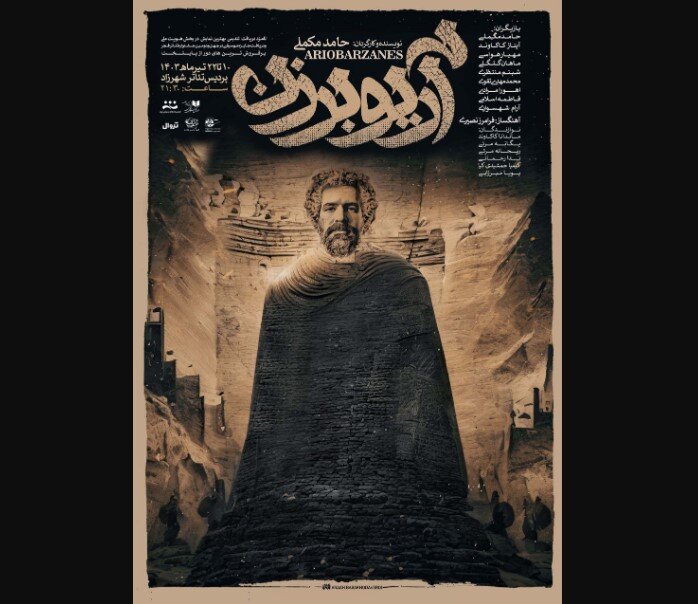Iranian director brings ancient hero to life on Tehran stage

TEHRAN- Iranian director Hamed Mokameli will bring the legendary Ariobarzanes of Persis to life on the stage of Shahrzad Theater Complex in Tehran on Monday.
The play, which features live music and stage design, has a limited number of performances.
Ainaz Kakavand, Mahyar Havasi, Shabnam Montazeri, Mohammad Mehdi Taqavi, Ahoura Moradi, Fatemeh Eslami and Aram Shahsavari are the main members of the cast for the play, which will remain on Stage until July 12.
The play has been one of the best-selling shows outside of Tehran, having impressed audiences in Qazvin in April and May. Additionally, it has won the Best Music Award at the 42nd Fajr International Theater Festival and has been nominated for Best National Identity Award in this major artistic event.
Ariobarzanes was an Achaemenid prince and Persian military commander who lived in the 4th century B.C. He was the son of Artabazus, a satrap of Phrygia, and grandson of Pharnabazus. Ariobarzanes was educated in both Persian and Hellenic culture and spent several years at the court of Philip II of Macedonia, where he developed close ties with the royal family.
Ariobarzanes became the governor of a part of Persis, a region in modern-day Iran, and was responsible for defending it against the encroaching Macedonian army led by Alexander the Great. He was a skilled military commander and strategist, known for his bravery and tactical genius.
At the Battle of Gaugamela in 331 B.C., Ariobarzanes led a significant force of Persian troops against Alexander's army. Although the Persian army was defeated, Ariobarzanes' unit fought valiantly, and he himself escaped with his life.
After the battle, Ariobarzanes blocked Alexander's path to Persepolis, attempting to deprive him of his battle formation and superior numbers. He set up a defensive position at the Persian Gate, a narrow mountain pass with steep flanking slopes that controlled the route to Persepolis. The gate was heavily fortified with a wall and outworks, and Ariobarzanes had prepared his troops to defend it against all comers.
Alexander's army consisted of over 10,000 men, while Ariobarzanes had an estimated 700 men. Despite being outnumbered, Ariobarzanes allowed Alexander to advance 30 stadia before attacking, hoping to lure him into a trap. However, Alexander's men were unable to engage the Persians or protect themselves from the flanking attacks, and they retreated to their camp.
The next day, Alexander launched a surprise attack on the Persian outposts, catching Ariobarzanes' men off guard. The Persians fought bravely but were ultimately defeated, and many were killed or wounded. Ariobarzanes himself escaped with a few men, fleeing into the hills. The battle at the Persian Gate was seen as a serious challenge to Alexander's conquest of Iran, but he was able to overcome it through his strategic thinking and bravery.
The battle is often compared to the famous Battle of Thermopylae, where a smaller Greek force led by Leonidas held off a massive Persian army for several days before being defeated. Like Thermopylae, the battle at the Persian Gate was a heroic last stand by Ariobarzanes and his men against overwhelming odds.
SAB/
Leave a Comment